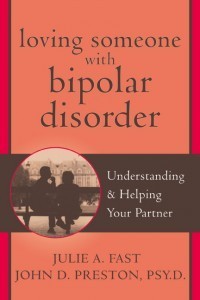Julie A. Fast's Blog, page 79
March 26, 2012
When Does Adult Onset Bipolar Disorder Start?
 My bipolar disorder symptoms started with hypomania at 17. I didn't realize this until I sat down and really thought about my teenage years. This is actually a very common time to have a first mood swing. My ex partner had a lot of depression before he had his first major manic/psychotic episode at 22. That was a terrible time for sure. When I think back of what he told me about college- he was definitely depressed for a long time. He told me he thought about suicide when he was a little kid. He didn't have an episode after that for a long time- then college at 19 and he got depressed and left school. So his first major depression was at age 19- but the minor stuff was already there. I didn't have any depression until I was 19.
My bipolar disorder symptoms started with hypomania at 17. I didn't realize this until I sat down and really thought about my teenage years. This is actually a very common time to have a first mood swing. My ex partner had a lot of depression before he had his first major manic/psychotic episode at 22. That was a terrible time for sure. When I think back of what he told me about college- he was definitely depressed for a long time. He told me he thought about suicide when he was a little kid. He didn't have an episode after that for a long time- then college at 19 and he got depressed and left school. So his first major depression was at age 19- but the minor stuff was already there. I didn't have any depression until I was 19.
If you have bipolar disorder, it's really interesting to write a paragraph about what you remember between the ages of 13-20. What was the first sign you had bipolar and how long did it take from that time for you to get diagnosed?
If you have a child with bipolar disorder, what were their teenage years like?
I had my first hypomania at 17 and was finally diagnosed at 31. Not cool. I wish I had been diagnosed sooner!
Julie
PS: This is all about adult onset bipolar disorder. It's different when a child is younger. They symptoms can be different and many health care professionals are more cautious with treatment.
Related posts:
WEB MD article on childhood onset bipolar disorder pt two
WEB MD article on childhood onset bipolar disorder pt one
Are you in there Ivan?
 When my former and much loved partner Ivan got sick, it happened very, very quickly. There were small signs for weeks that we missed- but that's understandable and no one had ever even heard of bipolar disorder. We knew something was wrong on the day of his birthday party. He looked different- his eyes were wide and his face was very illuminated. He talked constantly and had very strong opinions on things he had never found interesting in the past. He told me how to parallel park my car and he didn't drive!
When my former and much loved partner Ivan got sick, it happened very, very quickly. There were small signs for weeks that we missed- but that's understandable and no one had ever even heard of bipolar disorder. We knew something was wrong on the day of his birthday party. He looked different- his eyes were wide and his face was very illuminated. He talked constantly and had very strong opinions on things he had never found interesting in the past. He told me how to parallel park my car and he didn't drive!
We laughed because it was all so crazy. What was he doing? He's a fun and interesting guy, but all of this talking and disagreeing and telling us his genius ideas. When it became bizarre, we knew something was wrong.
That was the first night of an eight month journey of hospital stays, court visits, medication side effects, relationship fears and unbelievable stress.
When my coaching clients ask me how I understand them so well, I can always say: I have been there!
One day I was in the back yard with Ivan. It was so sunny and we were sitting by a little pond my brother had built for fish. Ivan was in between hospitalizations, but it still wasn't him sitting there. I was so naive. He couldn't really have a conversation he was so manic and psychotic. I remember looking at his face and thinking-
Where are you Ivan? Are you in there? Where have you gone? Will you ever come back?
It makes you wonder about the essence and soul of a person if an illness can so completely take over their mind.
This story has a very good ending. Ivan recovered from this episode and never had a psychotic/manic episode again. That is him on the beach in Cannes, France.
If you love someone with this illness, it can get better. It usually does. Ivan is proof!
Julie
PS: Ivan and I are still good friends. He is now living in France working in a job he loves. He lives with bipolar disorder of course. It's still there. Reality is reality!
Related posts:
Loving Someone with Bipolar Disorder: Understanding and Helping Your Partner
March 25, 2012
Having a clear mind is the goal of bipolar disorder treatment
 My Mind Is Blank (at least for a few days!)
My Mind Is Blank (at least for a few days!)
I never thought that I would see the day when I actually would have a blank mind. Sometimes I have to even think about what to think about. I've never really had this happen in my life. When you have bipolar disorder, your mind is usually filled with a bunch of garbage. Talking, music, other noises, unwanted thoughts; it's like one big garbage dump. I know that sounds pretty harsh, but it's definitely how I've experienced many days in the past few years.
Having a clear mind is the goal of bipolar disorder treatment.
Everything that I do, everything that I choose, everything that I say it's all with the intention of having a clear mind. The interesting thing is that if I do get into situations that I know are triggers, my mind garbage starts back up and all the stuff starts to whirl around in my head again. I've gotten so sensitive to triggers that I can tell almost immediately if something is a bad situation for me.
For example, an ex recently called and we kept missing each other on the phone. This is someone whom I of course wanted to see, but knew that it probably wasn't the best thing to do. Part of my mind said, It' s okay, you're doing better, don't worry about it. But the other part of my mind started to get worried, obsessive, talkative, and just plain uncomfortable. I had to make a choice between the two. I like to think that for the rest of my life I will choose the one that's reasonable: the one that doesn't cause bipolar disorder symptoms. I decided not to meet this old friend.
Julie
Related posts:
International Clear Out Your Email Inbox Day!
The Super Bowl- my learning lesson in bipolar disorder treatment!
Animals, love and bipolar disorder treatment!
Newsletter: Keep Your Friendships Strong! Focus on Facts- not BIPOLAR Disorder FEELINGS!
 Many people are encouraged to get in touch with their feelings and let go and experience life! I think that's great- for most people. But there are those of us who can't trust our feelings at all. For example, a friend and I went to karaoke the other night when I was really depressed – When her other friends came in, I felt she was ignoring me. My mind started to foresee the end of our relationship! It said, "How can she do this to me! What kind of friend is she! I am just going to leave without even saying goodbye! That will show her!"
Many people are encouraged to get in touch with their feelings and let go and experience life! I think that's great- for most people. But there are those of us who can't trust our feelings at all. For example, a friend and I went to karaoke the other night when I was really depressed – When her other friends came in, I felt she was ignoring me. My mind started to foresee the end of our relationship! It said, "How can she do this to me! What kind of friend is she! I am just going to leave without even saying goodbye! That will show her!"
Oh, what on earth was I thinking? I wasn't thinking- I was just in all bipolar emotion mode and had no command of the facts. I know that my feelings when I'm sick are manufactured from an ill brain- and these were definitely manufactured feelings. Understanding this has completely saved my relationships.
As I sat there, with my feet up in the chair in front of me and my arms crossed over my chest like a petulant child- I looked at her back and just felt so left out and hurt. Then I got my perspective and said to myself, "Julie, this person has been a loyal, loving and kind friend to you for years. She is always there for you. She loves you. And the one night in the past few years that you go out and she pays attention to someone else- you freak out. You're depressed tonight. You're lonely. If she had this behavior on another night, you would simply go over there and sit with her instead of rolling in your miserable feelings over here. Now snap out of it! You promised yourself, you will never, ever take out your bipolar disorder emotions on a friend. If you have trouble with her behavior outside of bipolar, look at the facts and how you really feel and go from there. But if this is just because you're depressed- then it's up to you to treat her with the respect she deserves."
I put my feet down, uncrossed my arms, walked the one foot to her chair, put my hand on her shoulder and sat down. She was happy to see me and we had a laugh when I told her what I was thinking.
Julie
Related posts:
Bipolar Disorder and Focus: How do you do it Julie?
Focus, Focus, Focus!
Newsletter: Bipolar Disorder and Paranoid Delusions
Bipolar Disorder Medication Blog Posts
Bipolar Disorder Medication Blog Posts
All of my blogs are divided into categories- you can see the list on the right- I've been consolidating them for the past few weeks. Here's an example of what's included in the medications category:
Medications: Abilify, tegretol, depakote, lithium, lamictal, lamotrigine, zyprexa, serequel, anti depressants, medical treatment of bipolar disorder, medications used to treat bipolar disorder, side effects, anti convulsants, anti psychotics, mood stabilizers, mania medications, depression medications, anxiety medications, talking with your doctor about medications, family members on medications, family members who refuse medications, medications in the news, what medications should a person with bipolar disorder take, etc etc!
Can you believe there is so much to learn about medications and bipolar disorder! If you just take an hour to read all of the blogs in this category, you will know more than most people on the planet about the drugs used to treat the illness. It's fascinating information. I have learned it slowly- it's the best way to take it all in.
Just one hour and you're on your way to bipolar medication expertise!
Julie
Related posts:
A note about the bipolarhappens.com bipolar medications category
Keep trying to find the right bipolar disorder medication…..
Keep trying to find the right bipolar disorder medication…..
Newsletter: A letter from a partner of a person with bipolar disorder pt 2……..
Here is what I need from you in our relationship:
1. TAKE YOUR MEDS.
2. Do the basics in order to stay stable. There are many things in your control that are easy to do.
3. Learn what your own bipolar disorder looks like and sounds like. You can then take care of yourself first and I can then help.
4. Think before you speak- yes, you can do this even when you are manic. Read about the Bipolar Conversation in Take Charge of Bipolar Disorder. We can read this book together.
5. Understand what it is like for me on the outside looking in. I have a very different experience of bipolar disorder than you do.
6. Let me in on your treatment including health care visits and medication changes.
7. Think of ME. I am not a therapist, doctor, punching bag, caretaker or parent. I need and expect an equal relationship where we work together to manage the illness and keep our relationship loving and strong.
8. Always remember that I love you and that your health means everything to me.
Thank you,
Your Loving Partner
Related posts:
Newsletter: A letter to the partner of a person with bipolar disorder pt 1….
Loving Someone with Bipolar Disorder: Understanding and Helping Your Partner
Reader asks if her partner can forgive her..
Loving Someone with Bipolar Disorder: Understanding and Helping Your Partner
 I remember driving home from the hospital after seeing my partner Ivan in the psych ward. I was sobbing in fear and hopelessness. It was 1994 and Ivan had just been diagnosed with bipolar disorder. I didn't even know what it meant. I had never heard of the illness. Was it curable? Was he faking? The staff in the hospital were often wonderful, but I could tell they had ZERO idea of what I was going through. I had so many fears- I couldn't sleep. I didn't know if he was going to die. I couldn't work. Does bipolar disorder last forever? How long would he be in the hospital? What is psychosis? What is mania? Why is he saying such crazy things? Doesn't he love me anymore? I went through this for months. There were only a few books on the market about the illness and there was nothing for a partner. I was alone and his only advocate.
I remember driving home from the hospital after seeing my partner Ivan in the psych ward. I was sobbing in fear and hopelessness. It was 1994 and Ivan had just been diagnosed with bipolar disorder. I didn't even know what it meant. I had never heard of the illness. Was it curable? Was he faking? The staff in the hospital were often wonderful, but I could tell they had ZERO idea of what I was going through. I had so many fears- I couldn't sleep. I didn't know if he was going to die. I couldn't work. Does bipolar disorder last forever? How long would he be in the hospital? What is psychosis? What is mania? Why is he saying such crazy things? Doesn't he love me anymore? I went through this for months. There were only a few books on the market about the illness and there was nothing for a partner. I was alone and his only advocate.
Ivan was in the hosptial for two months. I met his doctor once in the elevator.
When it was finally time for Ivan to come home, I wasn't given any advice. No one told me that I should watch out for suicidal behavior or what to do if he got sick again. It was all up to me.
I remember sitting in an office with his nurse practitioner a few weeks later. Ivan was a zombie from all of the medications. His hands shook so badly he couldn't write. He was miserable and I was miserable and scared. I said to the nurse practitioner, "I'm not sure what to do. Ivan seems so sluggish. He can't work and he is so unhappy. I don't know what to do!" Here is the reply I received:
"Don't you think you're getting a bit too involved in all of this Julie?"
At that moment I said- enough. I am taking over. Ivan and I had a tough, tough time, but we worked together and he got better. I remember thinking: If we make it through this, and we will, I am going to write a book so that a partner of someone with bipolar disorder will NEVER have to go through what I went through.
I wrote Loving Someone with Bipolar Disorder: Understanding and Helping Your Partner for everyone who is in a relationship with someone who has bipolar disorder. I know it can help you create a loving and positive relationship with your partner.
You can 100% work together to manage this illness.
All of the steps you need are in the book.
Happiness is possible.
Julie
PS: I am very happy to say that bipolar disorder health care has improved since Ivan was so ill. There is more contact with health care professionals in the hospital and they definitely understand more about what we go through. But if your partner is ill, you will have to advocate for what YOU need.
Related posts:
Newsletter: A letter from a partner of a person with bipolar disorder pt 2……..
Newsletter: A letter to the partner of a person with bipolar disorder pt 1….
Bipolar Family and Partner Coaching
March 24, 2012
A Special Sight at Karaoke
 I am at my favorite karaoke bar in Portland, Oregon. A man completely dressed as a Klingon from Start Trek just sang Bon Jovi's song Dead or Alive in the KLINGON language.
I am at my favorite karaoke bar in Portland, Oregon. A man completely dressed as a Klingon from Start Trek just sang Bon Jovi's song Dead or Alive in the KLINGON language.
Only in Portland!
Julie
Related posts:
the song that keeps on giving…
It's My Birthday Today! 47
March 23, 2012
Get comfortable with uncomfortable bipolar disorder thoughts!
 OMG. My brain says the most ridiculous things- things I would NEVER say on my own. It creates relationships that aren't there- goes over conversations that never happened and then makes me feel like it's all true. It has taken me years to realize that I can deny these thoughts- yell at these thoughts and beg them to go away- sometimes this works, sometimes is doesn't. It's very hard to live with a constant conversation in your head.
OMG. My brain says the most ridiculous things- things I would NEVER say on my own. It creates relationships that aren't there- goes over conversations that never happened and then makes me feel like it's all true. It has taken me years to realize that I can deny these thoughts- yell at these thoughts and beg them to go away- sometimes this works, sometimes is doesn't. It's very hard to live with a constant conversation in your head.
I've worked on this for 13 years, so I guess it's a never ending battle! It's defintely better. The most important thing is that I don't act out on these thoughts like I used to. This has saved my relationships- especially with the new people that come into my life. Watching my triggers diligently has made the biggest difference. I feel like a monk though. These days I'm learning to just let these thoughts roam around in my head and laugh at them when I can. Haha. My brain just said WHAT?
Julie
Related posts:
Bipolar Disorder and OCD thoughts
Living with bipolar suicidal thoughts…
Reader comment on suicidal thoughts….
March 22, 2012
Newsletter: Bipolar Disorder and Paranoid Delusions
 Parnoia is a type of psychosis called a delusion. A delusion is a false belief.
Parnoia is a type of psychosis called a delusion. A delusion is a false belief.
For example, paranoia can be the belief that you have done something wrong and that a person or an organization is upset with you. This is a scary delusion as it feels so real.
Paranoia used to really cause me a lot of trouble. I have worked hard so that I can at least recognize it before it makes me do something stupid.
I often get the feeling that my friends are ignoring me and that they have met friends they like a lot better than myself. It's a terrible feeling. Luckily, I know the signs of paranoia and I don't act on them, instead I call my friends and ask them to do something. When they say yes, I know that all is fine. My friends are the type who will tell me if something is wrong- so my paranoia is almost always rooted in bipolar and not reality.
Paranoid feelings are FALSE. Worry based on at least some fact is real.
Paranoia does not stand up to factual questioning- but for the person in the paranoid episode, it feels more real than anything they have ever experienced. It's important to remember than it feels real for them. If you try to talk a paranoid person out of their beliefs, it won't work.
Here are some examples of paranoia. Have you seen these in yourself or your loved ones?
1.Beleiving that someone is standing across the street staring at you through your apartment window, but when you look outside, there is nothing there.
2. Feeling with great certainty that your coworkers have a plan to get you fired. You know this becuase when they are in a group and walk up to them, they all sccatter in different directions without saying hi.
3. Once, when my former partner Ivan was in the hosptial, he was very, very paranoid. I went in one day to say hello and he looked at me and said, "Why is your face so red? Have you been doing something wrong that you aren't telling me?" True paranoia. He told me later that he really believed it.
When you are well, these thoughts never even come up. You know there is no one outside and you know for sure that your colleagues like you. They simply go back to their desks when they finish a conversation.
The dangerous this about paranoia is acting on it. Calling the cops for a man who isn't there or confronting coworkers for talking behind your back.
Question: What is the best treatment for paranoia? Anti psychotics and a management plan such as the Health Cards to make sure the paranoid symptoms are caught early so they don't move into destructive behavior. This is what I have done, so it's possible!
Julie
PS: You can sign up for the newsletter on the upper right corner of the blog.
Related posts:
Reader Question: What is the difference between schizophrenia and bipolar disorder?
Bipolar Disorder II and Psychosis
bipolar brain chatter
Julie A. Fast's Blog
- Julie A. Fast's profile
- 67 followers




